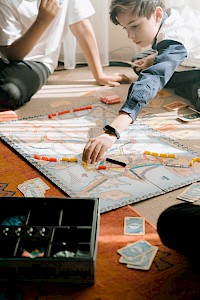 Board games can be a great way to develop a variety of skills in a fun way. Here are some fun activities involving board games that could help keep kids engaged, interested and learning. You can adapt the game for different skill levels.
Board games can be a great way to develop a variety of skills in a fun way. Here are some fun activities involving board games that could help keep kids engaged, interested and learning. You can adapt the game for different skill levels.
Gross motor skills
You don’t have to be limited to only following the rules when playing a board game. You can always integrate different challenges into the game to help work on gross motor skills. Encourage kids to sit cross legged when playing board games to increase their core strength.
- Encourage kids to use their right hand to reach for items on the left side of their body and their left hand to reach for items on the right side. This is an important skill for tasks like getting dressed and handwriting.
- To keep a board game interesting for kids with a short attention span, a simple obstacle course can be used between each turn - involve jumping/hopping, animal walks, climbing over or under, skipping, balancing etc.
- Developing spatial awareness by placing pieces of the board game ‘in front’, ‘behind’, ‘to the left’, ‘to the right’, ‘on top’ etc.
Fine motor skills
Board games are a great way to develop fine motor skills – picking up dice/cards/small pieces using ‘pinchy’ fingers can be great practice for developing these skills.
- A great way to develop hand strengthening is for kids to make their way around the obstacle course in between turns holding a small item using pinchy fingers.
- Integrating use of playdough within a board game.
- Encouraging them to set up and pack the board game away.
Vision
You can encourage kids to respond to visual input through fun board games for those that have difficulty registering or recognising different visual stimuli.
- Comparing different coloured/shaped/pictured/cardboard game pieces to recognise what is the same or what is different.
- Visual tracking from one side of the board to the other can be a great skill to practice and will become useful for reading skills.
- At the beginning of a board game you could turn it into a scavenger hunt, hiding all the pieces around a room for your child to find.
Social skills
It goes without saying that board games assist children to develop social skills. Some tips to assist with development of social skills through board games are:
- How to decide who goes first? - playing ‘rock, paper, scissors’ can be a useful way to prevent arguing. Alternatively, each player rolling the dice to see who gets the highest number can be a great way to decide.
- Turn taking – prompting ‘who is next?’, ‘your turn, my turn’.
- Emotional regulation – often when children become fixated on winning and have difficulty regulating their emotions if they lose, role modelling can assist. Reinforcing the importance of saying ‘good game’ or ‘thanks for playing’ can assist with peer to peer interactions and ability to make friends.
Related Blog Posts
If you liked this post you may also like:
Developing the Pencil Grasp
Mastering Buttons and Fasteners
Playing together 101
Using POP-UP PIRATE To Grow



